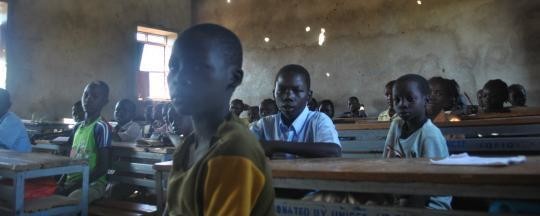The chairperson of the Central Equatoria State Teachers Union Peter Ladu Tombe said educators are leaving their profession over low pay and poor health care because the state government has not responded to repeated requests to improve their livelihoods.
In an exclusive interview with Radio Tamazuj, Ladu said the situation for teachers is so dire that they have ceased to complain and have begun “lamenting” the sorry state of education in Central Equatoria.
“The problems of teachers has become chronic because the demands of teachers, the welfare of teachers seem to be falling in to deaf ears,” Ladu said. “Nobody is willing to intervene and raise the standard of teachers.”
Low pay
The union leader said the lowest paid teachers in Central Equatoria receive salary of only 280 SSP per month, about 17 US dollars at street exchange rates, plus a “chalk allowance” of 270 SSP. He said the chalk allowance was supposed to be 300 SSP but ten percent has been deducted as a public service tax.
Ladu said they have demanded other allowances for housing, hardship, uniforms, and transportation for years with no success.
He said lack of allowances directly impacts students’ learning. For instance, without transportation allowance, teachers must walk long distances to work which reduces their classroom performance.
Ladu said basic teachers should receive at least 5000 SSP per month, equivalent to about 300 dollars, while those with higher qualifications such as diplomas or masters degrees should receive at least 9000 SSP per month.
Teachers cannot afford basic health care amid the low pay, Ladu claimed. He said ten teachers have died in Central Equatoria this year due to inability to pay for proper treatment.
“We are not able to afford to go and see a doctor, so when the sickness develops without us knowing, then it come to appear at the last moment then there is no way out, the person dies,” he said. “Some of our teachers fall sick and we have to fly them to foreign countries for treatment but some are unable [to afford].”
Reaching the lamentation point
He said teachers are being exploited for their work, so many educators are now leaving the profession entirely. “Teachers have reached to the lamenting point. It is no longer complaining I now term it lamentation,” he said.
Ladu demanded government and NGOs mobilize to keep qualified teachers in classrooms. He suggested a “back to teaching” campaign, similar to the nationwide “back to learning” campaign which aims to enroll up to 400,000 South Sudanese children in school.
“Parents are very good, even programs of NGOs and government say, ‘let all the children go to school,’ ” Ladu said. “I am very surprised no any other organizations, no government program says, ‘let every teacher come to teach.’ “
The educator said better pay would be an incentive to keep teachers in classrooms, and could attract more qualified teachers.
Ladu warned that the government should minimize recruitment of untrained teachers. He said currently the majority of the state’s 5000 teachers are unqualified. Increasing salaries could help to attract degree holders to the profession and to retain teachers who have graduated in the field of education, he said.
Talk, but no action
Still, Ladu said he did not expect any change because they have been complaining about poor conditions of teachers for a long time with no positive result.
He said the state government preaches that education is a priority in the new budget, but the state has made such claims before.
“There is no hope that the budget would change the lives of the teachers since life of teachers has remained the same despite politicians saying good things on behalf of teachers without action,” he said.
The educator said there is mistrust between government and teachers as long as lawmakers do not live up to their word.
Ladu urged politicians not to politicize education and should let technocrats do their work. He hinted they imagine the consequences if teachers do not teach for a full week.
The union boss said every country is judged by its teachers and poor teachers’ status means a poor country. He said without qualified teachers the population will suffer from lack of life skills, values, and health.
Ladu called on the public to respect teachers as they serve every child in the nation. He said South Sudan will not improve as a nation without teachers to educate children to be responsible citizens.




